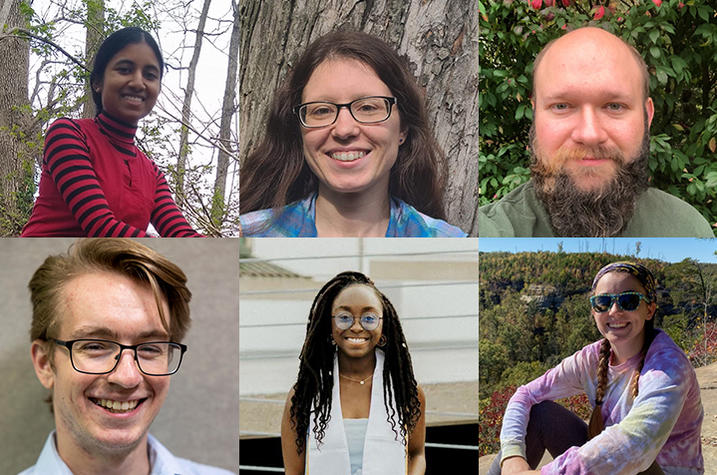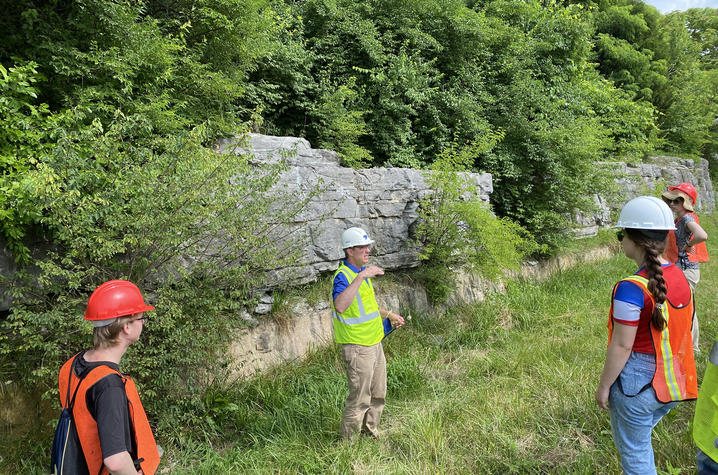Meet the 1st Cohort of KGS Paul Edwin Potter Interns
LEXINGTON, Ky. (June 24, 2022) — The first cohort of interns in a new Kentucky Geological Survey (KGS) program are spending their summers contributing to statewide research projects focused on geologic resources, environmental issues and natural hazards affecting Kentucky.
The new Paul Edwin Potter Internship Program is giving University of Kentucky students interested in geoscience research the opportunity to get real world experience and engage in a hands-on research project for 10 weeks throughout the summer. Although the program was limited to UK students during its first year, it will be expanded in future years to include students from other universities.
Supported by a generous gift from the late Paul Edwin Potter, a former professor of geology at the University of Cincinnati, the program aims to expand and enrich geoscience training opportunities for students.
Each intern is paired with a KGS expert who is giving them individualized mentorship and guidance as they collaborate on a research project. Projects in the 2022 program focus on topics including geologic hazards, critical minerals and environmental justice. The program will culminate in presentations at the KGS Paul Edwin Potter Internship showcase at KGS on July 29.
“Beyond contributing to research projects, our interns participate in weekly professional development discussions,” said KGS’s Elizabeth Adams, who serves as coordinator for the program. “We hope they will leave the program with a better understanding of career opportunities and more confidence in their professional abilities."
The weekly activities include field experiences, classes to develop technical skills and sessions focused on career planning, networking and interview preparation.
Meet the six 2022 interns — all students from the College of Arts and Sciences — and learn more about their summer projects:
Dilni Abeyrathne, an undergraduate in the Department of Geography and Department of International Studies, is working with KGS Director Bill Haneberg, on a project to map landslides associated with mountaintop removal coal mining and their potential impacts on environmental justice issues in Kentucky.
Alex Arimes, an undergraduate in the Department of Earth and Environmental Sciences, is working with landslide geologist Matt Crawford, using the KGS unmanned aerial vehicle and geographic information system techniques to evaluate past landslide activity in eastern Kentucky.
Russel Rogers, a graduate student in the Department of Earth and Environmental Sciences, is working with seismologist Seth Carpenter, using new instrumentation to investigate the effects of near-surface sediments on seismic waves in the New Madrid seismic zone.
Ellie Stevens, an undergraduate in the Department of Geography, is working with KGS hydrogeologist Junfeng Zhu, to identify sinkholes from lidar elevation data with assistance from a machine learning model.
Alex Thomas, a graduate student in the Department of Earth and Environmental Sciences, is working with Haneberg and KGS geological mapping section head Drew Andrews using a drone-based gamma spectrometer to develop methods for mapping radon gas potential in Kentucky soils.
Zachary Walton, a 2022 graduate from the Department of Earth and Environmental Sciences, is working with geologist Gina Lukoczki, in the KGS fluid inclusion lab where he is helping with an ongoing KGS critical mineral research project.
As the state’s flagship, land-grant institution, the University of Kentucky exists to advance the Commonwealth. We do that by preparing the next generation of leaders — placing students at the heart of everything we do — and transforming the lives of Kentuckians through education, research and creative work, service and health care. We pride ourselves on being a catalyst for breakthroughs and a force for healing, a place where ingenuity unfolds. It's all made possible by our people — visionaries, disruptors and pioneers — who make up 200 academic programs, a $476.5 million research and development enterprise and a world-class medical center, all on one campus.






